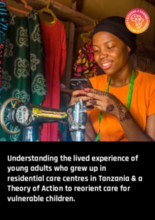This mixed-methods study collects survey data from 253 adults involved with vulnerable children in Tanzania and narrative data from 31 young adults who experienced residential care during their childhood. The research fills a gap in the literature about the lived experiences of children in institutional care and the impacts of this type of care on their lives.
The findings reveal a societal consensus on the primary role of the family in child-rearing, and acknowledges the potential harms of residential care. Survey data indicates that 59% of respondents consider preventing family separation crucial, and an overwhelming 98% suggest the need to strengthen families. 63% of respondents who are involved in residential care provision agree that it can be harmful.
In spite of social expectations that centre the family in children's lives, a lack of alternative support options for vulnerable children results in these institutions being perceived as an escape route from challenging home environments. Interviewees perceive life in care as a quest for safety, but their expectations are often unmet. Upon leaving care, young people are insufficiently re-integrated into their families and communities. Consequently, post-care life is often characterised by a lingering sense of unarticulated loss.
Residential care homes in Tanzania constitute a part of a disordered care landscape, reflecting a fragile circle of care around vulnerable children. Despite the value put on family, much care of vulnerable children is outsourced to institutional settings. Alternative care options that shield children from the adverse effects of poverty or family violence, while concurrently preserving familial ties, are limited. The primary concern of participants is to find a way to support the family unit in the face of dwindling social cohesion, and to do so in a way that meets both children’s basic needs and their psychological well-being. The study concludes with a proposed theory of action that takes a multifaceted approach to reorienting the care for vulnerable children, emphasising a need for stronger support for struggling families to prevent family separation.
Also see:
- Study on the Experience of Alternative Care Leavers in Chiang Mai & Chiang Rai, Thailand
- Vem Ska Tro På Mig?

